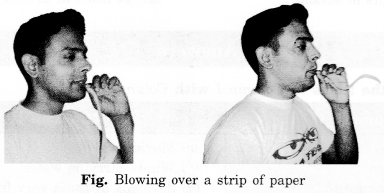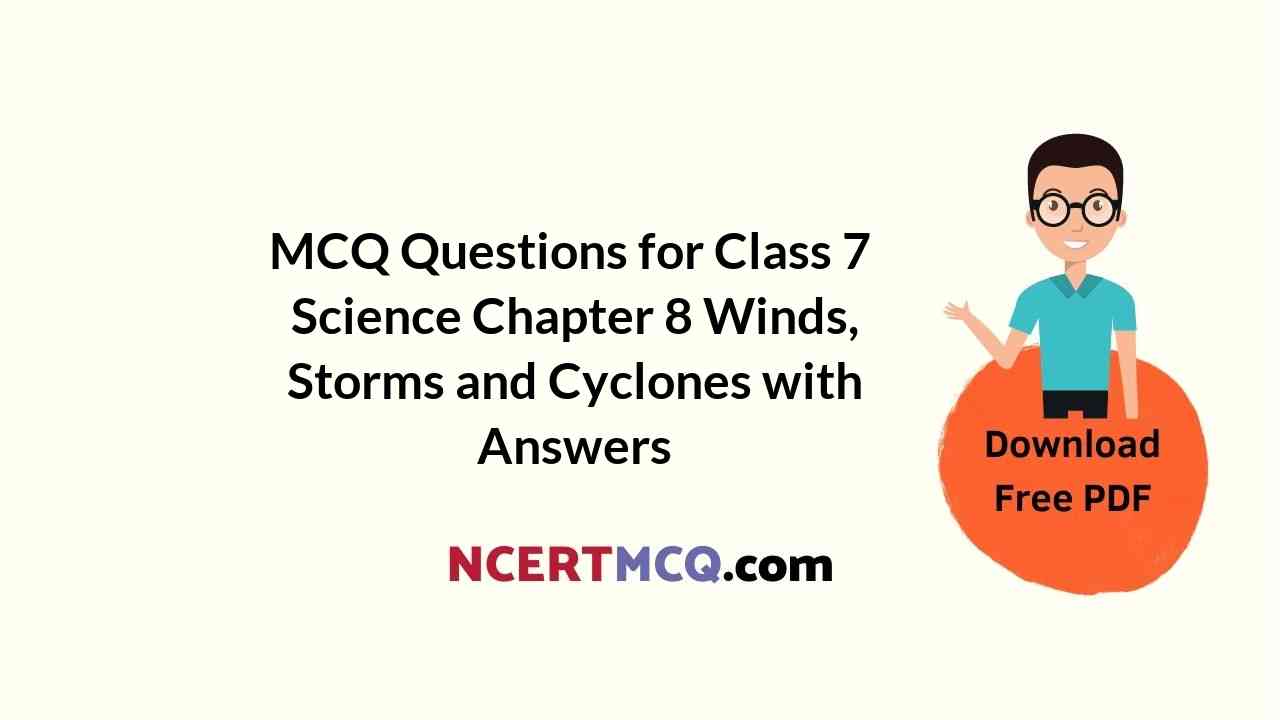Check the below Online Education NCERT MCQ Questions for Class 7 Science Chapter 8 Winds, Storms and Cyclones with Answers Pdf free download. MCQ Questions for Class 7 Science with Answers were prepared based on the latest exam pattern. We have Provided Winds, Storms and Cyclones Class 7 Science MCQs Questions with Answers to help students understand the concept very well. https://ncertmcq.com/mcq-questions-for-class-7-science-with-answers/
You can refer to NCERT Solutions for Class 7 Science Chapter 8 Winds, Storms and Cyclones to revise the concepts in the syllabus effectively and improve your chances of securing high marks in your board exams.
Class 7 Science Chapter 8 MCQ With Answers
Science Class 7 Chapter 8 MCQs On Winds, Storms and Cyclones
Choose the correct answer:
Class 7 Science Chapter 8 MCQ Question 1.
In which year was Orissa hit by a cyclone?
(a) 1999
(b) 2000
(c) 2001
(d) 2004
Answer
Answer: (a) 1999
MCQ Questions For Class 7 Science Chapter 8 Question 2.
Leaves of trees, banner or flags flutter when wind is blowing. Why?
(a) Air occupies space
(b) Air is a mixture of gases
(c) Air exerts pressure
(d) Air is colourless
Answer
Answer: (c) Air exerts pressure
QWind Storm And Cyclone Class 7 MCQ uestion 3.
When we blow over a paper strip it goes upward as shown in the figure given below. why?

(a) Blowing over the paper reduces the air pressure above the strip
(b) Blowing over the paper increases the air pressure above the strip
(c) None of these is a correct reason
(d) The strip will not go upward at all
Answer
Answer: (a) Blowing over the paper reduces the air pressure above the strip
Class 7 Science Ch 8 MCQ Question 4.
Following are precautions one must take in case a storm is accompanied by lightning.
(i) Do not take shelter under a tree.
(ii) Do not take shelter under an umbrella with a metallic end.
(iii) Do not take shelter in open garages, storage sheds, etc.
(iv) Do not take shelter in a bus in the open.
Which one of these is not correct?
(a) (i)
(b) (ii)
(c) (iii)
(d) (iv)
Answer
Answer: (d) (iv)
MCQ Questions For Class 7 Science With Answers Chapter 8 Question 5.
Which of the following places is most likely to be affected by a cyclone?
(a) Mumbai
(b) Puri
(c) Goa
(d) Porbandar
Answer
Answer: (b) Puri
Winds Storms And Cyclones Class 7 MCQ Question 6.
A fire alarm usually detects smoke in case of fire. Where should such an alarm be placed in a room? (NCERT Exemplar)
(a) Near the door
(b) On the floor
(c) On any wall
(d) On the ceiling
Answer
Answer: (d) On the ceiling
Class 7 Chapter 8 Science MCQ Question 7.
The winds from oceans carry water and bring rain. These winds are called
(a) typhoon
(b) monsoon
(c) cyclone
(d) none of these
Answer
Answer: (b) monsoon
Class 7th Science Chapter 8 MCQ Question 8.
What is a cyclone?
(a) Winds from the oceans carrying water
(b) Very low pressure system with very high speed winds revolving around it
(c) Dark funnel shaped cloud that reaches from the sky to the ground
(d) None of these
Answer
Answer: (b) Very low pressure system with very high speed winds revolving around it
Ch 8 Science Class 7 MCQ Question 9.
Pick the odd one out
(a) Cyclone
(b) Hurricane
(c) Monsoon
(d) Typhoon
Answer
Answer: (c) Monsoon
Science Class 7 Chapter 8 MCQ Question 10.
A cyclone warning can be issued
(a) 48 hours in advance
(b) 12 hours in advance
(c) 6 hours in advance
(d) 24 hours in advance
Answer
Answer: (d) 24 hours in advance
Match the following:
| Column A | Column B |
| (i) Wind | (a) Dark funnel shaped cloud |
| (ii) Monsoon | (b) Very low pressure system with very high speed winds revolving around it |
| (iii) Thunderstorm | (c) measures the speed of wind |
| (iv) Cyclone | (d) develops in India very frequently |
| (v) Tornado | (e) Moving air |
| (vi) Anemometer | (f) Winds carrying water |
Answer
Answer:
| Column A | Column B |
| (i) Wind | (e) Moving air |
| (ii) Monsoon | (f) Winds carrying water |
| (iii) Thunderstorm | (d) develops in India very frequently |
| (iv) Cyclone | (b) Very low pressure system with very high speed winds revolving around it |
| (v) Tornado | (a) Dark funnel shaped cloud |
| (vi) Anemometer | (c) measures the speed of wind |
Fill in the blanks:
1. Moving ………………… is called a wind.
Answer
Answer: air
2. Air exerts …………………
Answer
Answer: pressure
3. Increased wind speed is accompanied by ………………… air pressure.
Answer
Answer: reduced
4. The warm air is ………………… than cold air.
Answer
Answer: lighter
5. Wind currents are generated due to ………………… heating on the earth.
Answer
Answer: uneven
6. Very pressure system with very ………………… speed winds revolving around it is called a cyclone.
Answer
Answer: low,high
7. A dark funnel shaped ………………… that reaches from the sky to the ground is called a tornado.
Answer
Answer: cloud
8. ………………… and ………………… have made possible to issue a cyclone alert, i.e., 48 hours in advance.
Answer
Answer: Satellites, radars
Choose the true and false statements from the following:
1. Air around us exerts pressure.
Answer
Answer: True
2. Air contracts on heating and expands on cooling.
Answer
Answer: False
3. As cool air rises air pressure at that place is reduced and the warmer air moves to that place.
Answer
Answer: False
4. Winds carrying water vapours bring rains.
Answer
Answer: True
5. High speed winds and air pressure differences can cause cyclones.
Answer
Answer: True
6. Cyclones are beneficials to the people living in coastal areas.
Answer
Answer: False
7. Tornadoes are very frequent in our country.
Answer
Answer: False
8. It has become easier to monitor cyclones with the help of advanced technology like satellites and radars.
Answer
Answer: True
We hope the given NCERT MCQ Questions for Class 7 Science Chapter 8 Winds, Storms and Cyclones with Answers Pdf free download will help you. If you have any queries regarding Winds, Storms and Cyclones CBSE Class 7 Science MCQs Multiple Choice Questions with Answers, drop a comment below and we will get back to you soon.
Class 7 Science MCQ:
- Nutrition in Plants Class 7 MCQ
- Nutrition in Animals Class 7 MCQ
- Fibre to Fabric Class 7 MCQ
- Heat Class 7 MCQ
- Acids, Bases and Salts Class 7 MCQ
- Physical and Chemical Changes Class 7 MCQ
- Weather, Climate and Adaptations of Animals to Climate Class 7 MCQ
- Winds, Storms and Cyclones Class 7 MCQ
- Soil Class 7 MCQ
- Respiration in Organisms Class 7 MCQ
- Transportation in Animals and Plants Class 7 MCQ
- Reproduction in Plants Class 7 MCQ
- Motion and Time Class 7 MCQ
- Electric Current and Its Effects Class 7 MCQ
- Light Class 7 MCQ
- Water: A Precious Resource Class 7 MCQ
- Forests: Our Lifeline Class 7 MCQ
- Wastewater Story Class 7 MCQ
